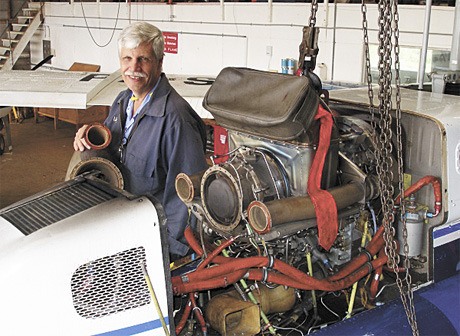Mission aviation first appealed to Lloyd Marsden when he was serving in the Navy.
He had read about Nate Saint, the martyred missionary pilot whose aviation skills were crucial in the effort to share the Gospel with an Ecuadorian tribe.
It was during Marsden’s time in the Navy, the majority of which he spent in a submarine, that God got a hold of his life and started pointing him toward missions, he said.
He saw the need for mission aviation in countries where transportation was either difficult or impossible without planes.
So, he began looking for mission opportunities. The 1969 Mercer Island High School graduate enrolled at Christian Heritage College (now San Diego Christian College) in San Diego, Calif., where he obtained a pilot’s license, mechanic’s license and a degree in missions and missions aviation maintenance. He then became a member of Wycliffe Bible Translators and found JAARS, a nonprofit organization dedicated to supporting Bible translation. Founded in 1948, JAARS — which was originally an acronym for Jungle Aviation and Radio Service — partners with Wycliffe and SIL International.
“JAARS was more appealing to me because it has a direct input into a ministry — the ministry of Bible translation, and to me that was a very important thing to do,” Marsden, 58, said.
After an evaluation process and training with Wycliffe, Marsden started building a support base. He then attended orientation and more training at JAARS headquarters in Waxhaw, N.C., before receiving his assignment: Papua New Guinea, where he has serviced planes for the past eighteen years.
Cessna 206 and 402, Britten-Norman Islander BN-2T, King Air B200, a brand new Quest Kodiak out of Idaho, Bell JetRanger helicopter and Bell LongRanger helicopter — Marsden maintains them all as a technician and licensed air maintenance engineer, along with eight other mechanics.
They begin each day with prayer.
“The Lord has greatly blessed our efforts,” said Marsden, who attributes the safety of the pilots and maintenance crew to God.
The fleet logs in a couple thousand flight hours every year, navigating long, narrow airstrips of grass or dirt on steep, tree-covered mountains or deep river valleys. The rugged terrain and lack of decent roads make many places in Papua New Guinea accessible only by airplane.
Marsden, who was trained to operate a nuclear power plant in the Navy, now takes turbine engines apart, sends the pieces off for inspection, and puts them back together in the field. He has pulled an engine out of a Cessna 206 and put another one back in. He works on almost everything — except for radios, as he is in the process of obtaining radio licensing.
“We are getting quite a bit of maintenance time and because of the conditions we work in, [the planes] tend to break a lot,” Marsden said.
Sometimes, aircraft that break down are inoperable for a week because parts usually take a minimum of seven days to be shipped; there is no convenience of UPS next-day air.
“Usually, the only times I get out [to remote villages] are when an aircraft is broken and I have to go fix it. And it’s gone from replacing just one component on an engine to actually taking apart a propeller and putting a new one in place and then sending it off to the maintenance facility for special tests,” said Marsden, who lives in Ukarumpa, near one of Papua New Guinea’s main ports, Lae.
“You won’t find it on the map,” he said.
At an elevation of 5,100 feet, Ukarumpa is the base of operations for JAARS’ largest aviation program where an estimated 450 to 500 missionaries live and work.
Marsden lives in a one-bedroom house constructed of woven bamboo and material akin to pressboard to keep the cold out.
The planes in his fleet transport translators between Ukarumpa and outlying villages; assist with medical emergencies; and carry cargo.
“This is our reason why we do this: the Bibles,” said Marsden, who has seen newly translated Bibles get delivered to villages.
“People have really appreciated how they have their own Scriptures,” he said. “Some tears are shed because they are very happy with having their own personal Bible.”
This year, Bibles have been translated into 10 Papua New Guinean languages.
Translation is a decades-long process of developing an alphabet and word lists, and learning the language, Marsden explained. No written form exists for any of the languages, so translators work closely with native speakers during the process.
Papua New Guinea has an estimated 860 languages among its 600 islands, and the New Testament portion of the Bible has been translated into more than 170 of those languages, according to JAARS.
“It’s a beautiful country, and the people, the ones I know, are really special people,” said Marsden, who has been on furlough since April and plans to return to Papua New Guinea in January if he has enough funds — support which comes from individuals and churches, such as Northshore Baptist Church, in Bothell, and Shadow Mountain Community Church, in San Diego.
For every year that Marsden serves in Papua New Guinea, he can take three months off.
Now on his fourth furlough, Marsden is staying on Mercer Island with his mother, who expects him to stay for Christmas, he said.
“I just enjoy having him come home — the sound of his voice, and the way he says ‘Mother,’” said Mary Marsden, who has lived on Mercer Island for 49 years. It gives her great joy, she said, that he is serving the Lord.



